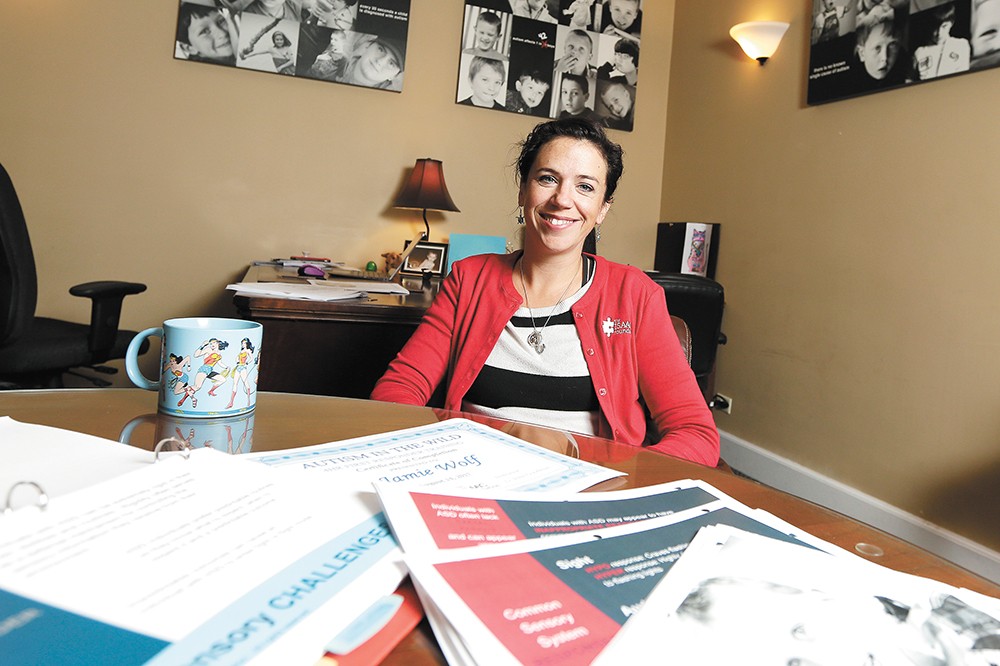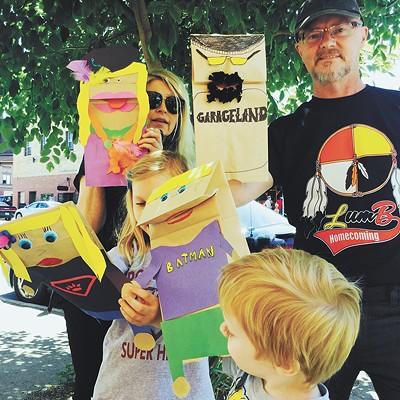
As a mother to kids on the autism spectrum, Holly Bahme Lytle knows what typical behavior looks like for a person with autism.
She also recognizes that you might see someone spinning in circles, stomping their feet, hitting themselves or engaging in other odd behavior and think that person is intoxicated or dangerous. First responders can often have the same reaction, she says.
As part of her work with the ISAAC Foundation, which she started in 2007, Bahme Lytle has helped develop a curriculum to teach first responders how to interact with people with autism and other disabilities. She developed the curriculum along with Spokane Fire Department Lt. John Goodman, who also has a child with autism.
"These are people we're going to be interacting with, and some are mildly affected and hold jobs, and some are not," Goodman says. "This training really parlays itself into the autism world, and to other disabled folks."
Since 2015, the curriculum has expanded into a full-blown, four-hour training course for firefighters, emergency personnel and police. All Spokane police officers have had the hour-long training, and at least 32 officers have taken the full course as part of the "enhanced crisis intervention training." And when Sheriff Ozzie Knezovich caught wind of the program, his office pushed to have the curriculum nationally certified.
In August, the law-enforcement-geared curriculum — called "Autism in the Wild" — earned national accreditation from the International Association of Directors of Law Enforcement Standards and Training. Now, more cops throughout the country will learn what it's like inside the mind and body of a person with autism, and how to communicate with them. Goodman says he's working on a national accreditation for the firefighters' version of the training.
This training is becoming essential for first responders, Bahme Lytle says.
The number of people in the United States diagnosed with autism spectrum disorder continues to rise (1 in 68 in 2012, compared to 1 in 150 in 2007), according to the Autism and Developmental Disabilities Monitoring Network. And an analysis of recent data by the Ruderman Family Foundation, which advocates on behalf of people with disabilities, found that at least one-third of people killed by police have some type of disability.
"We have this training, and departments are using it because they want to do it," Bahme Lytle says. "They recognize that their people need it and the community needs it."
She points to the comments from community members, who've seen the training in action. One mother wrote to Bahme Lytle about her son's experience with Spokane firefighters.
"A firetruck and paramedics rolled, treated [him] for heat exposure, and treated him with great kindness," the mother wrote. "And when we got there to pick him up I asked about their training with individuals with autism and they mentioned the John Goodman training and the ISAAC Foundation. Yeah you!!!!"
Bahme Lytle is surrounded by kids' smiling faces in her downtown office — including the one in a single frame on her desk. Her son Isaac was diagnosed with autism at a young age. He died unexpectedly due to a heart defect, and in 2007, Bahme Lytle started the ISAAC Foundation, which is dedicated to helping those touched by autism.
Initially, her goal was to raise money to help families pay for the expensive therapy children with autism require. Her role has since expanded dramatically.
The training course that Bahme Lytle helped craft for Spokane's first responders is only one piece of her work. For the past three years, she's also organized station visits so that children with autism can get acquainted with the men and women who respond to emergencies. She's currently working on rolling out a similar school-based program.
She also helped install an "Isaac Alert" in the 911 dispatch system, which pops up as a note to first responders when they're called to a home with a person with autism or special needs. The alert tells emergency responders if the person is nonverbal, has physical limitations and could be a risk to wander away, among other things.
"As parents who have special-needs loved ones, we have to do things to help them be successful," she says. "It's not only first responders who need to do a better job at this. As a community, we all need to come together, and with this model, we can do that." ♦
The Isaac Foundation's 10th anniversary celebration is this Saturday. The event at Project ID (1412 W. Central Ave.) will feature bouncy houses, face painting and live music by Elijah and the Tufnels, Sovereign Citizen and Non Prophets and Spokane's Brenna Yaeger. Sat, 2 to 7 pm • $10, children under 3 are free





















